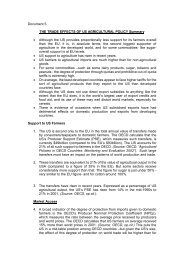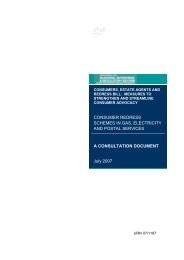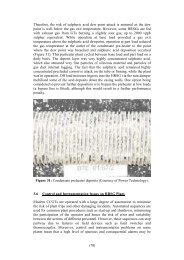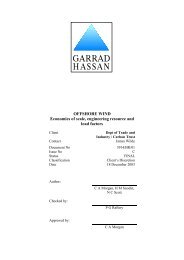A traders guide: the law relating to the - DTI Home
A traders guide: the law relating to the - DTI Home
A traders guide: the law relating to the - DTI Home
You also want an ePaper? Increase the reach of your titles
YUMPU automatically turns print PDFs into web optimized ePapers that Google loves.
A TRADER'S GUIDE:<br />
The Law Relating <strong>to</strong><br />
<strong>the</strong> Supply of Goods<br />
and Services<br />
APRIL 2005
The <strong>DTI</strong> drives our ambition of<br />
‘prosperity for all’ by working <strong>to</strong> create<br />
<strong>the</strong> best environment for business<br />
success in <strong>the</strong> UK. We help people<br />
and companies become more<br />
productive by promoting enterprise,<br />
innovation and creativity.<br />
We champion UK business at home<br />
and abroad. We invest heavily in<br />
world-class science and technology.<br />
We protect <strong>the</strong> rights of working<br />
people and consumers. And we<br />
stand up for fair and open markets<br />
in <strong>the</strong> UK, Europe and <strong>the</strong> world.
Contents<br />
Introduction .............................................................................3<br />
Summary of rights and remedies .........................4<br />
Conforming <strong>to</strong> Contract.................................................7<br />
Hiring Goods .......................................................................10<br />
Hire-Purchase and Conditional<br />
Sale Agreements..............................................................10<br />
Non-Consumer Claims ................................................13<br />
Suspending <strong>the</strong> Right <strong>to</strong> Reject ...........................13<br />
Sales Receipts ....................................................................14<br />
Credit Notes .........................................................................14<br />
Time Limit ..............................................................................14<br />
Minimising Losses ..........................................................16<br />
Consequential Loss........................................................16<br />
Free Guarantees / Warranties ................................17<br />
Retailers and <strong>the</strong>ir “Returns” Policies ............17<br />
Second-hand Goods......................................................17<br />
Auctions...................................................................................18<br />
Installation and Installation Instructions.......19<br />
Goods <strong>to</strong> be Manufactured or Produced......20<br />
Services ...................................................................................20<br />
Exclusion Clauses............................................................20<br />
1
Introduction<br />
As a trader you need <strong>to</strong> know how <strong>the</strong> <strong>law</strong><br />
<strong>relating</strong> <strong>to</strong> <strong>the</strong> supply of goods and services<br />
affects you and your cus<strong>to</strong>mers. This Guide<br />
attempts <strong>to</strong> explain <strong>the</strong> operation of <strong>the</strong> <strong>law</strong><br />
in <strong>the</strong> UK.<br />
UK <strong>law</strong> on sale of goods has evolved over<br />
many years. It is now principally set out in<br />
<strong>the</strong> Sale of Goods Act 1979 which has been<br />
amended by <strong>the</strong> Sale and Supply of Goods<br />
Act 1994 and more recently by <strong>the</strong> Sale and<br />
Supply of Goods <strong>to</strong> Consumers Regulations<br />
2002.<br />
However, <strong>the</strong> Supply of Goods and Services<br />
Act 1982 applies similar remedies <strong>to</strong> those<br />
in <strong>the</strong> sale of goods legislation where <strong>the</strong><br />
seller installs <strong>the</strong> goods or a contract is<br />
agreed for goods <strong>to</strong> be manufactured or<br />
produced (see "installation" on page 19 and<br />
"goods <strong>to</strong> be manufactured" on page 20).<br />
The Supply of Goods and Services Act 1982<br />
and <strong>the</strong> Supply of Goods (Implied Terms)<br />
Act 1973 provides protection for those who<br />
hire goods, or acquire <strong>the</strong>m under hire<br />
purchase, or conditional sale, agreements<br />
(see page 10).<br />
All buyers are entitled <strong>to</strong> remedies under<br />
<strong>the</strong> legislation but consumers are entitled <strong>to</strong><br />
a greater range of remedies. "Consumers"<br />
are defined as people who are buying for<br />
purposes not related <strong>to</strong> <strong>the</strong>ir trade, business<br />
or profession. Please bear this in mind<br />
throughout <strong>the</strong> Guide.<br />
A consumer's rights in relation <strong>to</strong> <strong>the</strong> sale<br />
and supply of goods cannot be curtailed in<br />
any way by a term in <strong>the</strong> contract.<br />
Restrictions might be possible in business<strong>to</strong>-business<br />
contracts but any restriction is<br />
subject <strong>to</strong> <strong>the</strong> provisions of <strong>the</strong> Unfair<br />
Contract Terms Act 1977 (see pages 20 & 21).<br />
When goods are faulty, buyers can<br />
generally only obtain a legal remedy against<br />
<strong>the</strong> retailer. Buyers are not usually able <strong>to</strong><br />
claim directly against <strong>the</strong> manufacturer.<br />
Consumers may have additional rights<br />
under any guarantee supplied with <strong>the</strong><br />
goods (see pages 17 & 18) or against a<br />
credit card company or finance house if <strong>the</strong><br />
goods are purchased by means of credit<br />
and cost more than £100.<br />
This Guide is concerned mainly with <strong>the</strong><br />
supply of goods but you should also be<br />
aware that in England, Wales and Nor<strong>the</strong>rn<br />
Ireland <strong>the</strong> Supply of Goods and Services<br />
Act 1982 provides <strong>the</strong> cus<strong>to</strong>mer with basic<br />
rights which apply in most contracts for<br />
services. Cus<strong>to</strong>mers in Scotland enjoy<br />
similar rights under <strong>the</strong> common <strong>law</strong>.<br />
Throughout <strong>the</strong> United Kingdom,<br />
never<strong>the</strong>less, a trader and a cus<strong>to</strong>mer can<br />
agree that <strong>the</strong>se rights do not apply <strong>to</strong> a<br />
particular transaction for <strong>the</strong> provision of<br />
a service or should only apply <strong>to</strong> a limited<br />
extent. Any such exclusion or restriction<br />
will however be subject <strong>to</strong> <strong>the</strong> provision<br />
of <strong>the</strong> Unfair Contract Terms Act 1977.<br />
See page 20 ("Services") and 20&21 ("Unfair<br />
Contract Terms Act 1977").<br />
If you sell goods at a distance, e.g. by mail<br />
order or over <strong>the</strong> internet, you should note<br />
that <strong>the</strong>re is additional legislation that<br />
applies <strong>to</strong> such sales which is not covered<br />
in this <strong>guide</strong>. There are additional <strong>guide</strong>s<br />
for business on <strong>the</strong> Consumer Protection<br />
(Distance Selling) Regulations 2000<br />
produced by <strong>the</strong> Department of Trade<br />
and Industry and <strong>the</strong> Office of Fair Trading.<br />
Details are on websites www.dti.gov.uk<br />
and www.oft.gov.uk.<br />
Please note that this Guide attempts<br />
<strong>to</strong> explain <strong>the</strong> civil <strong>law</strong> as it relates <strong>to</strong><br />
<strong>the</strong> supply of goods but does not include<br />
3
<strong>the</strong> criminal <strong>law</strong> such as, for example,<br />
matters covered by <strong>the</strong> Trade Descriptions<br />
Act. Of necessity some matters are over<br />
simplified so nei<strong>the</strong>r <strong>the</strong> general guidance<br />
nor <strong>the</strong> examples that appear throughout<br />
<strong>to</strong> illustrate particular points should be<br />
taken as legally authoritative.<br />
Summary of rights<br />
and remedies<br />
Buyers are entitled <strong>to</strong> goods of satisfac<strong>to</strong>ry<br />
quality, taking account of any description,<br />
<strong>the</strong> price and o<strong>the</strong>r relevant circumstances.<br />
If an item has a fault that is present at <strong>the</strong><br />
time of sale (sometimes referred <strong>to</strong> in this<br />
guidance as a "latent" or "inherent" fault),<br />
<strong>the</strong> consumer can complain once it is<br />
discovered.<br />
But buyers cannot expect a legal remedy<br />
in respect of:<br />
fair wear and tear;<br />
misuse or accidental damage; or<br />
if <strong>the</strong>y decide <strong>the</strong>y no longer want<br />
<strong>the</strong> item.<br />
Similarly, buyers cannot expect a legal<br />
remedy where goods have faults that <strong>the</strong>y<br />
knew about before <strong>the</strong> sale or that should<br />
have been evident on reasonable<br />
inspection.<br />
Remedies<br />
If a product that was faulty at <strong>the</strong> time of<br />
sale is returned <strong>to</strong> <strong>the</strong> retailer, <strong>the</strong> buyer<br />
is legally entitled <strong>to</strong>:<br />
a full refund, if this is within a reasonable<br />
time of <strong>the</strong> sale ("reasonable time" is not<br />
defined in <strong>law</strong> but is often quite short); or<br />
4<br />
a reasonable amount of compensation<br />
(or "damages") for up <strong>to</strong> six years from<br />
<strong>the</strong> date of sale (five years after discovery<br />
of <strong>the</strong> problem in Scotland).<br />
This does not mean all goods have <strong>to</strong> last<br />
six years! It is <strong>the</strong> limit for making a claim in<br />
respect of a fault that was present at <strong>the</strong><br />
time of sale. It is not equivalent <strong>to</strong> a<br />
guarantee.<br />
Additional rights for consumers<br />
Alternatively, consumers (see definition in<br />
<strong>the</strong> "Introduction") can choose <strong>to</strong> request<br />
instead:<br />
a repair or replacement.<br />
The retailer can decline ei<strong>the</strong>r of <strong>the</strong>se if he<br />
can show that <strong>the</strong>y are disproportionately<br />
costly in comparison with <strong>the</strong> alternative.<br />
However, any remedy must also be<br />
completed without significant<br />
inconvenience <strong>to</strong> <strong>the</strong> consumer. If nei<strong>the</strong>r<br />
repair nor replacement is realistically<br />
possible, consumers can request instead:<br />
a partial or full refund, depending on<br />
what is reasonable in <strong>the</strong> circumstances.<br />
It may be <strong>the</strong> case that a full refund is not<br />
<strong>the</strong> reasonable option because <strong>the</strong><br />
consumer will have enjoyed some benefit<br />
from <strong>the</strong> goods before <strong>the</strong> problem<br />
appeared. This needs <strong>to</strong> be taken in<strong>to</strong><br />
account before a reasonable partial refund<br />
can be assessed.<br />
As illustrated in <strong>the</strong> flow chart on page 6,<br />
consumers can switch between certain<br />
remedies if <strong>the</strong>y find <strong>the</strong>y are getting<br />
nowhere down <strong>the</strong> route originally selected.<br />
However, <strong>the</strong>y would have <strong>to</strong> give a retailer<br />
a reasonable time <strong>to</strong> honour a request<br />
before <strong>the</strong>y tried <strong>to</strong> switch, and <strong>the</strong>y could<br />
never pursue two remedies at <strong>the</strong> same time.
Proving <strong>the</strong> fault<br />
Generally, <strong>the</strong> buyer needs <strong>to</strong> demonstrate<br />
<strong>the</strong> goods were faulty at <strong>the</strong> time of sale.<br />
This is so if he chooses <strong>to</strong> request an<br />
immediate refund or compensation<br />
(damages).<br />
There is one exception. This is when <strong>the</strong><br />
buyer is a consumer and returns <strong>the</strong> goods<br />
in <strong>the</strong> first six months from <strong>the</strong> date of <strong>the</strong><br />
sale, and requests a repair or replacement<br />
or, <strong>the</strong>reafter, a partial or full refund. In that<br />
case, <strong>the</strong> consumer does not have <strong>to</strong> prove<br />
<strong>the</strong> goods were faulty at <strong>the</strong> time of <strong>the</strong><br />
sale. It is assumed that <strong>the</strong>y were. If <strong>the</strong><br />
retailer does not agree, it is for him <strong>to</strong> prove<br />
that <strong>the</strong> goods were satisfac<strong>to</strong>ry at <strong>the</strong> time<br />
of sale. For goods returned after six months<br />
<strong>the</strong> normal rules apply so that it would be<br />
for <strong>the</strong> consumer <strong>to</strong> demonstrate <strong>the</strong>y were<br />
faulty when sold.<br />
O<strong>the</strong>r situations covered<br />
The remedies of repair, replacement, partial<br />
refund and full refund are also available <strong>to</strong><br />
consumers:<br />
where installation by <strong>the</strong> retailer is not<br />
satisfac<strong>to</strong>ry;<br />
where installation instructions have<br />
serious shortcomings;<br />
generally where a good does not match<br />
<strong>the</strong> public statements made about it by<br />
<strong>the</strong> retailer, manufacturer, importer or<br />
producer; and<br />
where a specially commissioned product<br />
has relevant failings.<br />
These are greatly simplified explanations<br />
and <strong>the</strong>y are expanded on below.<br />
Alternative dispute resolution<br />
Although buyers do sometimes take court<br />
action, in day-<strong>to</strong>-day practice this is a rare<br />
event. In <strong>the</strong> vast majority of cases, <strong>the</strong><br />
buyer and retailer are able <strong>to</strong> reach a<br />
satisfac<strong>to</strong>ry solution without any need <strong>to</strong><br />
consider going <strong>to</strong> court. Where this is not<br />
possible, use of an alternative dispute<br />
resolution procedure or trade association<br />
scheme can be considered. Buyers can seek<br />
details from <strong>the</strong> retailer, <strong>the</strong> Community<br />
Legal Service or a Citizens Advice Bureau.<br />
Advice<br />
Buyers can obtain free advice from<br />
<strong>the</strong>ir local Citizens Advice Bureau<br />
(http://www.citizensadvice.org.uk/); <strong>the</strong>ir<br />
local council's Trading Standards Department<br />
(http://www.tradingstandards.gov.uk/);<br />
<strong>the</strong> Community Legal Service<br />
(http://www.clsdirect.org.uk); <strong>the</strong> Which?<br />
Online Legal Service (http://www.which.net);<br />
<strong>the</strong> OFT's Shoppers Guide<br />
(http://www.oft.gov.uk/News/Publications/Le<br />
aflet+Ordering.htm); and solici<strong>to</strong>rs (who<br />
may charge). The <strong>DTI</strong> is not able <strong>to</strong><br />
intervene in individual disputes.<br />
5
Sale of Goods – simple<br />
summary of consumers' rights<br />
and remedies<br />
6<br />
To reject <strong>the</strong><br />
goods and<br />
claim a refund<br />
of <strong>the</strong> <strong>to</strong>tal<br />
purchase price<br />
by <strong>the</strong> retailer.<br />
Yes<br />
Is <strong>the</strong> problem due <strong>to</strong> something<br />
present (e.g. a fault, something<br />
affecting durability or a<br />
misdescription) at <strong>the</strong> time of sale?<br />
Is it within a "reasonable time" (usually a fairly short period)<br />
since <strong>the</strong> date of <strong>the</strong> sale <strong>to</strong> allow <strong>the</strong> goods <strong>to</strong> be rejected?<br />
Yes<br />
Consumers can<br />
choose ei<strong>the</strong>r:<br />
A repair or a<br />
replacement, or failing<br />
that a partial or full<br />
refund (<strong>the</strong> burden of<br />
proof is on <strong>the</strong> retailer<br />
in <strong>the</strong> first six months)<br />
by <strong>the</strong> retailer.<br />
Alternatively,<br />
compensation may be<br />
claimed from <strong>the</strong><br />
retailer; typically <strong>the</strong><br />
cost of repairing or<br />
replacing <strong>the</strong> goods.<br />
No<br />
Yes<br />
No<br />
There is no legal<br />
right <strong>to</strong> redress.<br />
No<br />
Is it within six<br />
years of <strong>the</strong> sale<br />
(five years from<br />
discovery in<br />
Scotland) and is it<br />
reasonable for<br />
<strong>the</strong> goods <strong>to</strong> have<br />
lasted this long?
Conforming <strong>to</strong> Contract<br />
(The Implied Terms)<br />
When buyers complain about goods <strong>the</strong>y<br />
frequently say that <strong>the</strong>y are "faulty". What<br />
this means, in legal terms, is that <strong>the</strong> goods<br />
do not conform <strong>to</strong> contract, although this is<br />
not <strong>the</strong> language that is usually used in this<br />
situation.<br />
Goods would not conform <strong>to</strong> contract<br />
(would be faulty) if <strong>the</strong>y failed <strong>to</strong> work<br />
immediately from <strong>the</strong> time of sale. Indeed,<br />
goods might not conform <strong>to</strong> contract if <strong>the</strong>y<br />
failed <strong>to</strong> work later, even after a number of<br />
years, due <strong>to</strong> an inherent fault – i.e. one that<br />
could be said <strong>to</strong> exist at <strong>the</strong> time of sale.<br />
Goods also do not conform <strong>to</strong> contract if<br />
<strong>the</strong>y do not comply with any description<br />
given by <strong>the</strong> retailer prior <strong>to</strong> sale.<br />
The Sale of Goods Act 1979<br />
Conforming <strong>to</strong> contract<br />
The Sale of Goods Act, which governs<br />
whe<strong>the</strong>r <strong>the</strong>re is a lack of conformity with<br />
<strong>the</strong> contract, says that:<br />
Goods should match any description<br />
given <strong>to</strong> <strong>the</strong>m;<br />
Goods should be of satisfac<strong>to</strong>ry quality<br />
i.e. <strong>the</strong>y should meet <strong>the</strong> standard a<br />
reasonable person would regard as<br />
satisfac<strong>to</strong>ry, taking account of any<br />
description of <strong>the</strong> goods, <strong>the</strong> price (if<br />
relevant) and all o<strong>the</strong>r relevant<br />
circumstances;<br />
The quality of goods includes <strong>the</strong>ir state<br />
and condition and <strong>the</strong> following (among<br />
o<strong>the</strong>rs) are, in appropriate cases, aspects<br />
of <strong>the</strong> quality of goods -<br />
(a) fitness for all <strong>the</strong> purposes for which<br />
goods of <strong>the</strong> kind in question are<br />
commonly supplied;<br />
(b) appearance and finish;<br />
(c) freedom from minor defects;<br />
(d) safety; and<br />
(e) durability.<br />
Goods should be reasonably fit for any<br />
particular purpose that was made known<br />
<strong>to</strong> <strong>the</strong> retailer (unless <strong>the</strong> retailer disputed<br />
<strong>the</strong>ir appropriateness for that purpose at<br />
<strong>the</strong> time).<br />
If a dish is described as ovenproof but<br />
shatters when used under <strong>the</strong> normal<br />
conditions for making a casserole it<br />
would have been misdescribed and so<br />
would not conform <strong>to</strong> contract.<br />
If someone buys a self-assembly<br />
wardrobe and a panel is missing <strong>the</strong>n<br />
<strong>the</strong> goods are incomplete and would<br />
not conform <strong>to</strong> <strong>the</strong> contract.<br />
Description<br />
In practice nearly every transaction involves<br />
a description of some kind. Even where <strong>the</strong><br />
cus<strong>to</strong>mer selects goods without assistance,<br />
as in a self-service s<strong>to</strong>re, that is usually still<br />
a sale by description – for example, that on<br />
<strong>the</strong> label. When someone is supplied with<br />
goods and he relies on <strong>the</strong> description<br />
given of <strong>the</strong>m, <strong>the</strong> goods must be as<br />
described. For example, a car described as a<br />
2003 registered 1200cc car must have been<br />
registered in that year and be of that<br />
capacity.<br />
7
Satisfac<strong>to</strong>ry quality<br />
To be of satisfac<strong>to</strong>ry quality, goods must be<br />
of a standard that a reasonable person<br />
would regard as satisfac<strong>to</strong>ry at <strong>the</strong> time of<br />
sale (having regard <strong>to</strong> any description<br />
applied <strong>to</strong> <strong>the</strong>m, <strong>the</strong> price and all o<strong>the</strong>r<br />
relevant circumstances).<br />
In deciding whe<strong>the</strong>r goods are satisfac<strong>to</strong>ry<br />
<strong>the</strong> various aspects of quality which may be<br />
taken in<strong>to</strong> account include fitness for all <strong>the</strong><br />
purposes for which goods of <strong>the</strong> kind in<br />
question are commonly supplied,<br />
appearance and finish, freedom from minor<br />
defects, safety and durability. But in some<br />
circumstances o<strong>the</strong>r characteristics may<br />
also be relevant.<br />
Because appearance and finish and freedom<br />
from minor defects are relevant fac<strong>to</strong>rs, in<br />
appropriate cases <strong>the</strong> buyer is entitled <strong>to</strong><br />
expect that <strong>the</strong> goods will be free from even<br />
small imperfections. The durability<br />
requirement suggests that <strong>the</strong> goods should<br />
last for a reasonable time but it does not<br />
mean that <strong>the</strong>y remain of satisfac<strong>to</strong>ry<br />
quality for this time (see "Fair Wear and<br />
Tear" and "Durability" below).<br />
8<br />
Someone buying a new pair of shoes<br />
would clearly not expect <strong>the</strong> soles <strong>to</strong><br />
come away from <strong>the</strong> uppers after<br />
wearing <strong>the</strong>m in normal conditions for<br />
a few days.<br />
On <strong>the</strong> o<strong>the</strong>r hand, someone buying a<br />
10-year-old car from a dealer could not<br />
reasonably expect it <strong>to</strong> perform like a<br />
new car, although he could expect it <strong>to</strong><br />
give <strong>the</strong> kind of service that <strong>the</strong><br />
average car of that mileage and model<br />
would give.<br />
Particular purpose<br />
If a cus<strong>to</strong>mer says – or when it should be<br />
obvious <strong>to</strong> <strong>the</strong> retailer – that <strong>the</strong> goods are<br />
wanted for a particular purpose, even if that<br />
is a purpose for which those goods are not<br />
usually supplied, and <strong>the</strong> retailer agrees that<br />
<strong>the</strong> goods will meet <strong>the</strong> requirement, <strong>the</strong>n<br />
<strong>the</strong>y have <strong>to</strong> be reasonably fit for that<br />
purpose. If <strong>the</strong> retailer is not confident that<br />
<strong>the</strong> goods will meet <strong>the</strong> cus<strong>to</strong>mer's<br />
particular requirements, he should make<br />
this clear, perhaps on <strong>the</strong> receipt, <strong>to</strong> protect<br />
himself against future claims.<br />
If a consumer was <strong>to</strong>ld that certain<br />
software generally used on Apple<br />
computers was compatible with a PC<br />
and it was not, it would not conform <strong>to</strong><br />
contract. If no mention had been made<br />
about <strong>the</strong> PC and <strong>the</strong> software was<br />
bought on <strong>the</strong> assumption that it was<br />
compatible <strong>the</strong>n <strong>the</strong> consumer would<br />
not be likely <strong>to</strong> have grounds for<br />
complaint.<br />
Fair Wear and Tear<br />
Goods cannot always be expected <strong>to</strong> work<br />
fault-free. They can break down through<br />
normal use. Buyers cannot, <strong>the</strong>refore,<br />
expect <strong>to</strong> hold <strong>the</strong> seller responsible for fair<br />
wear and tear. There needs <strong>to</strong> be a fault that<br />
was present on <strong>the</strong> day of sale even though<br />
it only became apparent later on, or a<br />
misdescription of <strong>the</strong> goods, or a lack of<br />
durability that suggests <strong>the</strong> goods were not<br />
of satisfac<strong>to</strong>ry quality <strong>to</strong> start with.
If a central heating system s<strong>to</strong>pped<br />
working – because of its pump failing –<br />
four years after <strong>the</strong> sale, having had<br />
average usage, <strong>the</strong>n it might not be due<br />
<strong>to</strong> an inherent fault (latently <strong>the</strong>re on <strong>the</strong><br />
day of <strong>the</strong> sale) but due <strong>to</strong> it expiring at<br />
<strong>the</strong> end of its normally accepted working<br />
life. This is especially so if <strong>the</strong> relevant<br />
trade association had advised that such<br />
pumps only worked for an average of<br />
four years. If, however, <strong>the</strong> pump had<br />
only lasted half its expected life, having<br />
been subject <strong>to</strong> average usage, <strong>the</strong>n <strong>the</strong><br />
consumer would, no doubt, wish <strong>to</strong> seek<br />
an opinion as <strong>to</strong> whe<strong>the</strong>r <strong>the</strong> item had<br />
contained a latent fault or been<br />
constructed with sub-standard parts that<br />
made it not durable enough <strong>to</strong> pass <strong>the</strong><br />
satisfac<strong>to</strong>ry quality test.<br />
Durability<br />
Durability can be a difficult concept, but, as<br />
indicated in <strong>the</strong> “Fair Wear and Tear” example<br />
above, it is something that can be considered<br />
when evaluating whe<strong>the</strong>r goods conform <strong>to</strong><br />
contract. For example, if a product which<br />
should have a long life develops a major<br />
fault and cannot be repaired after a<br />
comparatively short period <strong>the</strong>n it may well<br />
fail <strong>the</strong> durability test. Everything has a<br />
finite life and this needs <strong>to</strong> be borne in mind<br />
when considering durability. Fac<strong>to</strong>rs that<br />
could be taken in<strong>to</strong> consideration in<br />
assessing durability might include:<br />
<strong>the</strong> price (a £200 tyre might be expected<br />
<strong>to</strong> last longer than a £50 one);<br />
inappropriate use (a small engine mower<br />
used <strong>to</strong> service a very large garden); or<br />
whe<strong>the</strong>r <strong>the</strong> product was subject <strong>to</strong><br />
greater use than normal (domestic<br />
washing machine used <strong>to</strong> regularly wash<br />
several families clo<strong>the</strong>s’).<br />
Additional Requirements<br />
for Consumer Sales<br />
Public statements<br />
Any public statements made by<br />
manufacturers, importers or producers (in<br />
addition <strong>to</strong> retailers) about <strong>the</strong> specific<br />
characteristics of <strong>the</strong> goods, particularly in<br />
advertising or on labelling, have <strong>to</strong> be<br />
factually correct – and form part of <strong>the</strong><br />
retailer's contract with <strong>the</strong> consumer.<br />
However, <strong>the</strong> retailer is not responsible for<br />
<strong>the</strong> statement, and <strong>the</strong> consumer is not<br />
entitled <strong>to</strong> redress, if <strong>the</strong> retailer shows:<br />
that for good reasons he was not aware<br />
of <strong>the</strong> statement;<br />
that it had been corrected in public<br />
before <strong>the</strong> conclusion of <strong>the</strong> sale; or<br />
that <strong>the</strong> consumer could not have been<br />
influenced by <strong>the</strong> statement.<br />
If a manufacturer ran UK advertising<br />
that a particular jet ski could run on<br />
unleaded fuel but it could not, <strong>the</strong><br />
consumer could require redress from<br />
<strong>the</strong> retailer.<br />
However, if a retailer could show that<br />
he was, for good reason, ignorant of<br />
<strong>the</strong> manufacturer's claims <strong>the</strong>n <strong>the</strong><br />
consumer would not be able <strong>to</strong> seek<br />
redress from <strong>the</strong> retailer over <strong>the</strong><br />
specific characteristic. An example<br />
could be erroneous claims made in a<br />
manufacturer's foreign, or regional,<br />
advertising campaign that <strong>the</strong> retailer<br />
could not reasonably be expected <strong>to</strong><br />
have come across.<br />
9
If <strong>the</strong> retailer argued that <strong>the</strong> claim had<br />
been corrected but <strong>the</strong> only evidence<br />
was a notice in an obscure trade<br />
magazine, <strong>the</strong>n this would probably<br />
not prove convincing. More effective<br />
publicity would be needed <strong>to</strong> alert<br />
consumers.<br />
Redress up <strong>the</strong> Supply Chain<br />
Any public statements made by<br />
manufacturers, importers or producers (in<br />
addition <strong>to</strong> retailers) on <strong>the</strong> specific<br />
characteristics of <strong>the</strong> goods, particularly in<br />
advertising or on labelling, have <strong>to</strong> be<br />
truthful. We have seen above that (i) if <strong>the</strong><br />
retailer could show that he was reasonably<br />
not aware of <strong>the</strong> statement, or (ii) that it had<br />
been corrected by <strong>the</strong> conclusion of <strong>the</strong><br />
sale, or (iii) that <strong>the</strong> consumer could not<br />
have been influenced by <strong>the</strong> statement, <strong>the</strong>n<br />
it can be disregarded.<br />
In circumstances where <strong>the</strong> retailer did not<br />
enjoy any of <strong>the</strong>se defences, <strong>the</strong> consumer<br />
could pursue him for redress for statements<br />
that <strong>the</strong> o<strong>the</strong>rs had made. However, <strong>the</strong><br />
retailer might have <strong>the</strong> right <strong>to</strong> pursue <strong>the</strong><br />
manufacturer, importer or producer for<br />
equivalent compensation and costs under<br />
<strong>the</strong> <strong>law</strong> of contract, depending on <strong>the</strong><br />
precise contractual arrangements in place.<br />
Where <strong>the</strong>re is no contractual link between<br />
<strong>the</strong> seller and <strong>the</strong> o<strong>the</strong>r party, <strong>the</strong> seller<br />
may, in certain circumstances, be entitled <strong>to</strong><br />
recover his losses from <strong>the</strong>m on <strong>the</strong> basis of<br />
<strong>the</strong> <strong>law</strong> of negligence.<br />
10<br />
Hiring Goods<br />
The cus<strong>to</strong>mer is entitled <strong>to</strong> expect <strong>the</strong> goods<br />
<strong>to</strong> be as described, of satisfac<strong>to</strong>ry quality<br />
and fit for <strong>the</strong>ir purpose in <strong>the</strong> same way<br />
as if he had bought <strong>the</strong> goods. Traders<br />
cannot deprive consumers of <strong>the</strong>ir rights<br />
by reference <strong>to</strong> a contract term but <strong>the</strong>y<br />
may be able <strong>to</strong> do so for non-consumers<br />
although any restriction or exclusion is<br />
subject <strong>to</strong> a test of reasonableness (see<br />
page 21).<br />
Hire-Purchase and<br />
Conditional Sale<br />
Agreements<br />
In <strong>the</strong> case of hire-purchase agreements,<br />
<strong>the</strong> buyer's rights will be against <strong>the</strong> finance<br />
company. Buyers can, in appropriate<br />
circumstances, reject goods or claim<br />
compensation (see below).<br />
In <strong>the</strong> case of conditional sale agreements,<br />
<strong>the</strong> buyer's rights are against <strong>the</strong> seller of <strong>the</strong><br />
goods. Buyers can, in appropriate circumstances,<br />
reject <strong>the</strong> goods or claim compensation.<br />
Additionally, consumers can request a repair or<br />
replacement (see below).<br />
Remedies<br />
The buyer has a number of remedies if<br />
goods do not conform <strong>to</strong> contract. All<br />
buyers can pursue <strong>the</strong> first two remedies<br />
below – <strong>the</strong> remainder are only available<br />
<strong>to</strong> consumers (that is "people who are<br />
buying for purposes not related <strong>to</strong> <strong>the</strong>ir<br />
trade, business or profession"). The rights<br />
of consumers are simply illustrated in <strong>the</strong><br />
flow chart on page 6.
Rejection of Goods<br />
Buyers can reject <strong>the</strong> goods and require<br />
<strong>the</strong>ir money back provided <strong>the</strong>y complain<br />
within "a reasonable time" (usually a short<br />
period).<br />
The Sale of Goods Act does not define what<br />
amounts <strong>to</strong> a "reasonable time" but buyers<br />
have <strong>to</strong> be given a reasonable time <strong>to</strong><br />
examine <strong>the</strong> goods <strong>to</strong> see if <strong>the</strong>y were<br />
satisfac<strong>to</strong>ry. Ultimately, <strong>the</strong> matter can<br />
only be decided by a court after taking in<strong>to</strong><br />
account all <strong>the</strong> circumstances. An important<br />
fac<strong>to</strong>r might be that <strong>the</strong> buyer was not in<br />
a position <strong>to</strong> check <strong>the</strong> goods for a longer<br />
time after <strong>the</strong> sale than usual, because,<br />
for example, he was admitted <strong>to</strong> hospital<br />
immediately after he purchased <strong>the</strong>m.<br />
Where a buyer is entitled <strong>to</strong> reject <strong>the</strong><br />
goods, he must tell <strong>the</strong> retailer immediately.<br />
He is not obliged <strong>to</strong> send <strong>the</strong>m back but<br />
must make <strong>the</strong>m available for collection.<br />
However, most buyers would return goods<br />
<strong>the</strong>y had <strong>the</strong>mselves taken away <strong>to</strong> assist<br />
<strong>the</strong>m convince <strong>the</strong> retailer <strong>the</strong>ir claim was<br />
legitimate and so speed things up.<br />
Where <strong>the</strong> buyer is not a consumer and <strong>the</strong><br />
problem is a slight one (e.g. <strong>the</strong>re is only<br />
a minor defect) <strong>the</strong>n <strong>the</strong> goods cannot be<br />
rejected although compensation can be<br />
claimed (see below).<br />
Claim for Compensation<br />
Buyers can instead claim compensation<br />
known as "damages", if <strong>the</strong>y are not entitled<br />
<strong>to</strong> reject <strong>the</strong> goods, or if <strong>the</strong>y choose not<br />
<strong>to</strong> request this.<br />
Compensation by way of damages is<br />
designed <strong>to</strong> compensate for actual losses<br />
and so normally amounts <strong>to</strong> <strong>the</strong> cost of<br />
repair or replacement (with goods of a<br />
similar age). Any direct and predictable<br />
expense arising as a result of being<br />
supplied with faulty goods can also<br />
be claimed by <strong>the</strong> cus<strong>to</strong>mer (see<br />
"Consequential Loss" on page 16).<br />
This could include <strong>the</strong> cost of returning<br />
<strong>the</strong> goods, for example. In some instances<br />
<strong>the</strong> cus<strong>to</strong>mer could get <strong>the</strong> defect remedied<br />
by someone else and claim <strong>the</strong> cost from<br />
<strong>the</strong> retailer as compensation for breach<br />
of contract. However, this is not advised<br />
as it might make it difficult <strong>to</strong> prove <strong>the</strong><br />
problem dated from <strong>the</strong> time of <strong>the</strong> sale.<br />
For a broken four-year-old clock with<br />
an inherent fault, a claim would<br />
typically be for <strong>the</strong> amount necessary<br />
<strong>to</strong> have it repaired or <strong>to</strong> purchase a<br />
similar four-year-old model (but in<br />
working order, of course).<br />
Repair and Replacement<br />
Consumers (see definition above) can,<br />
if purchases do not conform <strong>to</strong> contract<br />
and <strong>the</strong>y do not wish (or are not entitled)<br />
<strong>to</strong> reject <strong>the</strong> goods or claim compensation,<br />
specifically request a repair or a replacement.<br />
Confronted with a five-year-old piano<br />
with an inherent fault, <strong>the</strong> consumer<br />
can request that it be repaired ra<strong>the</strong>r<br />
than pursuing compensation <strong>to</strong> pay for<br />
a repair that he <strong>the</strong>n has <strong>to</strong> arrange<br />
himself. Alternatively, he could request<br />
a replacement five - year-old piano of<br />
<strong>the</strong> same/similar specification,<br />
assuming that finding one was<br />
practicable (perhaps only so for a<br />
dealer of both new and second-hand<br />
products).<br />
11
"Reasonable time" and "significant<br />
inconvenience"<br />
Repair and replacement have <strong>to</strong> be carried<br />
out within a reasonable time and without<br />
significant inconvenience for <strong>the</strong> consumer<br />
(if this is not possible <strong>the</strong> consumer should<br />
select an alternative remedy). The retailer<br />
has <strong>to</strong> bear any costs such as transporting<br />
<strong>the</strong> goods. Complaints have <strong>to</strong> be judged on<br />
a case-by-case basis and take account of all<br />
<strong>the</strong> circumstances including:<br />
<strong>the</strong> nature of <strong>the</strong> goods;<br />
<strong>the</strong> purpose for which <strong>the</strong>y were bought;<br />
and<br />
<strong>the</strong>ir importance <strong>to</strong> that particular<br />
cus<strong>to</strong>mer.<br />
12<br />
It is difficult <strong>to</strong> define "reasonable<br />
time" here just as it is <strong>to</strong> specify <strong>the</strong><br />
"reasonable time" for rejecting a good.<br />
In <strong>the</strong> case of a wedding dress, <strong>the</strong>re is<br />
clearly a crucial date in relation <strong>to</strong><br />
which <strong>the</strong> number of days involved<br />
may become critical and that may be<br />
<strong>the</strong> main deciding fac<strong>to</strong>r. Repair might<br />
<strong>the</strong>n not be feasible but a replacement<br />
might be appropriate.<br />
In <strong>the</strong> case of an electric drill <strong>the</strong><br />
number of days may be less critical<br />
than with a wedding dress. The<br />
possibility of using a hand drill needs<br />
<strong>to</strong> be considered.<br />
With a fridge, <strong>the</strong> lack of an alternative<br />
would weigh heavily in <strong>the</strong> analysis of<br />
this crucial household item but <strong>the</strong><br />
provision of a loaned item might prove<br />
part of a successful remedy and so<br />
avoid "significant inconvenience".<br />
"Disproportionate cost"<br />
A retailer can decline <strong>the</strong> repair remedy<br />
if <strong>the</strong> cost would be disproportionately<br />
higher than <strong>the</strong> cost of replacement – or<br />
vice versa. A decision on <strong>the</strong> cost being<br />
disproportionate should take account of <strong>the</strong><br />
value of <strong>the</strong> goods if <strong>the</strong>y were <strong>to</strong> conform<br />
<strong>to</strong> contract; <strong>the</strong> significance of <strong>the</strong> lack of<br />
conformity and whe<strong>the</strong>r <strong>the</strong> alternative<br />
remedy could be completed without<br />
significant inconvenience <strong>to</strong> <strong>the</strong> consumer.<br />
If a four-year-old table was only worth<br />
£50 and a repair would cost £75 <strong>the</strong>n<br />
<strong>the</strong> retailer could decline such a<br />
request and offer a replacement,<br />
assuming he had a similar four-yearold<br />
model in s<strong>to</strong>ck or had prompt<br />
access <strong>to</strong> one. If he had nei<strong>the</strong>r of <strong>the</strong><br />
latter, <strong>the</strong>n he could refuse both repair<br />
and replacement and would move<br />
on<strong>to</strong> <strong>the</strong> partial refund remedy.<br />
If <strong>the</strong> stitching had gone on a pair of<br />
trousers <strong>the</strong> cus<strong>to</strong>mer would not be<br />
entitled <strong>to</strong> a replacement if <strong>the</strong><br />
inherent fault could be repaired within<br />
a reasonable time and at little<br />
inconvenience.
Partial and Full Refund<br />
If repair or replacement are not practicable<br />
options, <strong>the</strong> legislation provides for <strong>the</strong><br />
alternative remedies of partial, or full,<br />
reduction in <strong>the</strong> price (a refund, in o<strong>the</strong>r<br />
words). In considering whe<strong>the</strong>r a full, or<br />
partial, refund is <strong>to</strong> be given, account needs<br />
<strong>to</strong> be taken of <strong>the</strong> benefit provided by <strong>the</strong><br />
good <strong>to</strong> <strong>the</strong> consumer, just as it is when<br />
determining compensation.<br />
If a spin dryer had cost £99 four years<br />
before and was two thirds of <strong>the</strong> way<br />
through its average length of life –<br />
when an inherent fault showed itself –<br />
<strong>the</strong>n <strong>the</strong> retailer might offer around<br />
£33 as an adequate reduction in price<br />
bearing in mind that <strong>the</strong> consumer<br />
was being deprived of one third of <strong>the</strong><br />
typical period for which he should<br />
have enjoyed <strong>the</strong> good. Account might<br />
also need <strong>to</strong> be taken of <strong>the</strong> fact that<br />
goods tend <strong>to</strong> depreciate more quickly<br />
in <strong>the</strong> early years of <strong>the</strong>ir life-span.<br />
If a consumer had had constant<br />
problems with a product, from <strong>the</strong><br />
time of <strong>the</strong> sale, <strong>to</strong> such an extent that<br />
he had never enjoyed any normal<br />
benefit from <strong>the</strong> product <strong>the</strong>n <strong>the</strong><br />
retailer might be expected <strong>to</strong> offer him<br />
a full refund of his money.<br />
Non-Consumer Claims<br />
Non-consumers are not entitled under <strong>the</strong><br />
legislation <strong>to</strong> a repair or replacement if <strong>the</strong>y<br />
have purchased goods that do not conform<br />
<strong>to</strong> contract but <strong>the</strong>y are still entitled <strong>to</strong><br />
redress. However, if buyers prefer not <strong>to</strong><br />
reject <strong>the</strong> goods or ask for compensation<br />
<strong>the</strong>re is nothing <strong>to</strong> prevent retailers offering<br />
a repair or replacement.<br />
If a computer was purchased for<br />
business use and has a fault it might<br />
be more convenient for <strong>the</strong> business <strong>to</strong><br />
try and come <strong>to</strong> an arrangement with<br />
<strong>the</strong> retailer for a simple repair or a<br />
replacement ra<strong>the</strong>r than formally<br />
rejecting <strong>the</strong> computer or seeking<br />
compensation.<br />
Suspending <strong>the</strong> Right<br />
<strong>to</strong> Reject<br />
It is important <strong>to</strong> note that, within <strong>the</strong><br />
reasonable period after <strong>the</strong> sale (see<br />
"Remedies" on page 4 and "Rejection of<br />
Goods" on page 11), buyers (both<br />
consumers and business buyers) do not<br />
lose <strong>the</strong>ir right <strong>to</strong> reject <strong>the</strong> goods/require<br />
<strong>the</strong>ir money back merely by agreeing <strong>to</strong> let<br />
<strong>the</strong> retailer try <strong>to</strong> repair <strong>the</strong>m. This is made<br />
clear by s.35(6) of <strong>the</strong> Sale of Goods Act.<br />
If <strong>the</strong> buyer returns <strong>the</strong> goods as not<br />
conforming <strong>to</strong> contract, and asks for<br />
his money back within a reasonable<br />
time, he may decide/be persuaded <strong>to</strong><br />
let <strong>the</strong> retailer make an attempt at<br />
repair. After he had given <strong>the</strong> retailer<br />
a reasonable time <strong>to</strong> complete this,<br />
with no success, he could fall back on<br />
requiring <strong>the</strong> return of <strong>the</strong> price paid.<br />
This might be because <strong>the</strong> repair was<br />
not carried out promptly enough or<br />
because it was not repaired <strong>to</strong> an<br />
adequate standard.<br />
13
Sales Receipts<br />
In providing redress <strong>to</strong> a buyer, a retailer<br />
is entitled <strong>to</strong> satisfy himself that <strong>the</strong> product<br />
was purchased at his s<strong>to</strong>re and on <strong>the</strong> date<br />
claimed. A sales receipt is a good way of<br />
providing such proof (as is a detailed credit<br />
card statement). Although sales receipts are<br />
not a legal requirement, buyers are advised<br />
<strong>to</strong> request <strong>the</strong>m where <strong>the</strong>y might later be<br />
needed and <strong>to</strong> keep <strong>the</strong>m safe.<br />
Credit Notes<br />
Buyers do not have <strong>to</strong> accept credit notes<br />
if goods do not conform <strong>to</strong> <strong>the</strong> contract.<br />
However, <strong>the</strong>y may be offered where<br />
<strong>the</strong> buyer has no legal right <strong>to</strong> any redress<br />
but <strong>the</strong> retailer wishes <strong>to</strong> be helpful e.g.<br />
<strong>the</strong> purchaser has a change of mind.<br />
The essential point is that credit notes are<br />
voluntary items. Retailers do not have <strong>to</strong><br />
offer <strong>the</strong>m and buyers do not have <strong>to</strong> accept<br />
<strong>the</strong>m but it is sometimes beneficial for both<br />
parties <strong>to</strong> use <strong>the</strong>m. The particular Terms<br />
and Conditions will explain <strong>the</strong> detail of<br />
how <strong>the</strong>y are <strong>to</strong> operate.<br />
14<br />
Time Limit – Six Years<br />
Maximum <strong>to</strong> Bring a Claim<br />
or Complaint<br />
Complaints can be brought <strong>to</strong> court up <strong>to</strong><br />
six years after a sale in England, Wales and<br />
Nor<strong>the</strong>rn Ireland (and five years after <strong>the</strong><br />
time of <strong>the</strong> discovery of <strong>the</strong> problem in<br />
Scotland). After that time, <strong>the</strong> Limitation<br />
Act 1980 generally prevents court cases<br />
being brought. This does not mean that<br />
goods have <strong>to</strong> last six years; it is not a<br />
durability requirement.<br />
A buyer could bring a case against a<br />
retailer, alleging non-conformity of<br />
contract, for up <strong>to</strong> six years after <strong>the</strong><br />
sale. However, he would find a court<br />
unsympa<strong>the</strong>tic in <strong>the</strong> latter years for<br />
low cost items that it was reasonable<br />
<strong>to</strong> expect <strong>to</strong> last only a short period (a<br />
£5 watch might not last many years<br />
but a £500 one should) or for<br />
consumables like oil filters which have<br />
a specified limited lifespan. Similarly,<br />
when a watch s<strong>to</strong>ps because a battery<br />
has come <strong>to</strong> <strong>the</strong> end of its life –<br />
assuming it had lasted a reasonable<br />
time – <strong>the</strong>re are no grounds for<br />
complaint that <strong>the</strong> watch is not<br />
conforming <strong>to</strong> contract.
The Burden of Proof and <strong>the</strong><br />
First Six Months<br />
In any dispute, it is usually for <strong>the</strong> buyer<br />
<strong>to</strong> prove that <strong>the</strong> goods do not conform <strong>to</strong><br />
contract. This is <strong>the</strong> case where buyers wish<br />
<strong>to</strong> pursue <strong>the</strong>ir right <strong>to</strong> reject goods, within<br />
a reasonable period, or seek compensation.<br />
"Reversed burden of proof"<br />
However, in <strong>the</strong> first six months after <strong>the</strong><br />
sale, when a consumer seeks <strong>the</strong> remedies<br />
of repair or replacement, or when <strong>the</strong>se are<br />
not practicable, partial or full refund, it is<br />
for <strong>the</strong> retailer <strong>to</strong> prove that <strong>the</strong> goods<br />
conformed with <strong>the</strong> contract in disputed<br />
cases. This is known as a "reversed burden<br />
of proof". After six months, however, it falls<br />
<strong>to</strong> <strong>the</strong> consumer <strong>to</strong> prove that <strong>the</strong> lack of<br />
conformity existed at <strong>the</strong> time of <strong>the</strong> sale.<br />
In <strong>the</strong> first six months a consumer<br />
could claim that a fault was present at<br />
<strong>the</strong> time of <strong>the</strong> sale and hence argue<br />
that <strong>the</strong> good was not of satisfac<strong>to</strong>ry<br />
quality and so seek redress. If <strong>the</strong><br />
retailer rejected this view, <strong>the</strong><br />
consumer could take <strong>the</strong> matter <strong>to</strong><br />
court where <strong>the</strong> judge would look <strong>to</strong><br />
<strong>the</strong> retailer <strong>to</strong> refute <strong>the</strong> presumption<br />
of unsatisfac<strong>to</strong>ry quality with<br />
reasonable evidence. The retailer<br />
might attempt this by, for example,<br />
expertly analysing <strong>the</strong> good <strong>to</strong> show it<br />
was damaged by <strong>the</strong> consumer e.g.<br />
where lea<strong>the</strong>r shoes had not been<br />
cleaned, so causing <strong>the</strong> lea<strong>the</strong>r <strong>to</strong><br />
crack.<br />
For faults that become apparent after<br />
six months, it is for <strong>the</strong> consumer <strong>to</strong><br />
provide evidence that <strong>the</strong> item did not<br />
conform <strong>to</strong> contract at <strong>the</strong> time of <strong>the</strong><br />
sale. Often <strong>the</strong> consumer and retailer<br />
are able <strong>to</strong> negotiate an acceptable<br />
solution but, ultimately, if <strong>the</strong> retailer<br />
believed that <strong>the</strong> good had conformed<br />
<strong>to</strong> contract at <strong>the</strong> time of sale, <strong>the</strong>n <strong>the</strong><br />
consumer would need <strong>to</strong> present<br />
enough evidence in a court <strong>to</strong><br />
substantiate his own claims. One way<br />
<strong>to</strong> do this, particularly in a high-value<br />
claim, might be <strong>to</strong> obtain <strong>the</strong> views of<br />
an expert that suggested <strong>the</strong> item was<br />
poorly manufactured or designed,<br />
such that it contained a fault that was<br />
likely or certain <strong>to</strong> make <strong>the</strong> product<br />
break down at some future date. O<strong>the</strong>r<br />
fac<strong>to</strong>rs would also need <strong>to</strong> be<br />
considered e.g. <strong>the</strong> price and nature of<br />
<strong>the</strong> goods.<br />
If <strong>the</strong> consumer reported a fault after <strong>the</strong><br />
first six months, <strong>the</strong> onus would be on <strong>the</strong>m<br />
<strong>to</strong> prove that <strong>the</strong> fault exhibited itself within<br />
<strong>the</strong> six months if <strong>the</strong>y wanted <strong>to</strong> enjoy<br />
<strong>the</strong> six months reversed burden of proof.<br />
Since proving <strong>the</strong> date of discovery of a<br />
fault is a difficult and unwanted hurdle<br />
for <strong>the</strong> consumer, <strong>the</strong> simple solution is<br />
<strong>to</strong> report faults as soon as <strong>the</strong>y become<br />
known – indeed, consumers may lose out<br />
if <strong>the</strong>y do not do so (see next section).<br />
15
Minimising Losses<br />
Buyers should act reasonably when seeking<br />
redress and not add unnecessary costs.<br />
This means <strong>the</strong>y should:<br />
(i) Report faults as soon as possible. If <strong>the</strong>y<br />
do not:<br />
it becomes more difficult for <strong>the</strong>m, as<br />
time goes by, <strong>to</strong> prove that <strong>the</strong> goods<br />
were inherently faulty at <strong>the</strong> time of<br />
sale; and<br />
it is possible that <strong>the</strong> goods can<br />
deteriorate more than o<strong>the</strong>rwise,<br />
especially if attempts are made <strong>to</strong><br />
repair or <strong>to</strong> continue using <strong>the</strong>m.<br />
The retailer would not be responsible<br />
for correcting this aspect.<br />
(ii) Make sure that <strong>the</strong>y service <strong>the</strong> goods<br />
as appropriate, follow any user<br />
instructions and look after <strong>the</strong>m, so as<br />
not <strong>to</strong> undermine <strong>the</strong>ir claim by<br />
contributing <strong>to</strong> any problem.<br />
Buyers cannot expect retailers <strong>to</strong> provide<br />
redress where <strong>the</strong>y have:<br />
accidentally damaged <strong>the</strong> goods;<br />
misused <strong>the</strong>m and caused a fault,<br />
perhaps through <strong>the</strong> use of incompatible<br />
accessories; or<br />
tried <strong>the</strong>ir own repair, or had someone<br />
else attempt a repair, which has damaged<br />
<strong>the</strong> goods.<br />
16<br />
Consequential Loss<br />
When a buyer suffers loss as a direct<br />
consequence of a faulty product, <strong>the</strong> buyer<br />
may be able <strong>to</strong> claim damages. In extreme<br />
cases, buyers might suffer injury or damage<br />
<strong>to</strong> o<strong>the</strong>r property which is directly<br />
attributable <strong>to</strong> <strong>the</strong> faulty product, and <strong>the</strong>se<br />
losses might be recoverable as<br />
consequential losses. In less serious<br />
situations, <strong>the</strong> buyer might find that he<br />
incurs extra expense as a direct result<br />
of buying faulty goods. Claims for<br />
consequential loss do not normally cover<br />
distress, inconvenience or disappointment.<br />
A specialist outdoor tank might be<br />
purchased <strong>to</strong> recycle spent water <strong>to</strong><br />
help <strong>the</strong> environment and reduce<br />
metered water charges. If it began<br />
leaking or s<strong>to</strong>pped working in some<br />
o<strong>the</strong>r way (because of a fault present<br />
at <strong>the</strong> time of sale), <strong>the</strong> higher water<br />
charges levied <strong>the</strong>reafter until repair<br />
could be claimed. Also, any phone<br />
costs involved in trying <strong>to</strong> fix <strong>the</strong><br />
problem, e.g. via technical lines<br />
provided, could be claimed.<br />
In claiming any consequential costs <strong>the</strong><br />
buyer would be expected <strong>to</strong> have acted<br />
reasonably with regard <strong>to</strong> how <strong>the</strong>y were<br />
accrued e.g. approaching <strong>the</strong> retailer for<br />
a solution immediately ra<strong>the</strong>r than first<br />
incurring expenditure hiring alternative<br />
equipment from elsewhere.
Free Guarantees/Warranties<br />
In addition <strong>to</strong> having <strong>the</strong>ir legal rights<br />
a consumer may be offered a guarantee<br />
(e.g. by a manufacturer or retailer) on a<br />
voluntary basis. Guarantees – sometimes<br />
called warranties – do not have <strong>to</strong> be<br />
offered but if <strong>the</strong>y are, those given free<br />
of charge with <strong>the</strong> product:<br />
will be legally binding on <strong>the</strong> person<br />
offering <strong>the</strong> guarantee;<br />
will have <strong>to</strong> be written in English and<br />
in plain intelligible words;<br />
must be available for viewing by<br />
consumers before purchase, e.g. by<br />
advising where <strong>the</strong>y may be seen such as<br />
on <strong>the</strong> internet for those with access; and<br />
state that <strong>the</strong>y do not affect <strong>the</strong><br />
consumer's legal rights.<br />
If a manufacturer reneged on a free<br />
guarantee <strong>the</strong>n <strong>the</strong> consumer could<br />
enforce it in a small claims court. The<br />
retailer would not be involved.<br />
If <strong>the</strong> consumer wishes <strong>to</strong> inspect a<br />
free guarantee, <strong>to</strong> help make a<br />
purchasing decision, <strong>the</strong>n <strong>the</strong> person<br />
offering it has <strong>to</strong> make it available – if<br />
<strong>the</strong>y cannot do so immediately, <strong>the</strong>y<br />
should follow up promptly with a copy<br />
which is posted or sent via email etc.<br />
Translation of free guarantees<br />
Where those offering free guarantees do<br />
not translate <strong>the</strong>m in<strong>to</strong> English, or<br />
habitually refuse <strong>to</strong> make <strong>the</strong>m available<br />
for viewing, <strong>the</strong> Office of Fair Trading and<br />
Trading Standards have <strong>the</strong> power <strong>to</strong> seek<br />
an injunction requiring <strong>the</strong>m <strong>to</strong> comply.<br />
Duration of free guarantees<br />
It is up <strong>to</strong> <strong>the</strong> company offering free<br />
guarantees <strong>to</strong> decide on <strong>the</strong>ir duration.<br />
Many products come with a free one-year<br />
guarantee; some have two or three years<br />
while o<strong>the</strong>rs have none. This is entirely<br />
legal.<br />
Retailers and <strong>the</strong>ir<br />
"Returns" Policies<br />
Some retailers offer "returns" policies (also<br />
known as "satisfaction" guarantees) such as<br />
promising <strong>the</strong> full money back for<br />
undamaged goods, for up <strong>to</strong> a set number<br />
of weeks, for whatever reason. These are<br />
useful additional rights <strong>to</strong> those <strong>the</strong> buyer<br />
has under <strong>the</strong> <strong>law</strong>. The terms and<br />
conditions would spell out exactly how<br />
<strong>the</strong>se were <strong>to</strong> work.<br />
Second-hand Goods<br />
The buyer has exactly <strong>the</strong> same rights with<br />
second-hand goods as he does with new.<br />
However, with older goods, it is increasingly<br />
difficult for <strong>the</strong> buyer <strong>to</strong> prove that a fault<br />
was inherent at <strong>the</strong> time of <strong>the</strong> sale. The<br />
conformity criteria also allow second-hand<br />
goods <strong>to</strong> be judged less rigorously than<br />
new, where reasonable.<br />
17
In judging whe<strong>the</strong>r a recently bought<br />
seven-year-old car conformed <strong>to</strong><br />
contract it would be reasonable <strong>to</strong> take<br />
account of <strong>the</strong> price paid. This could<br />
be far less than for a new vehicle and<br />
so expectations should be lower. It<br />
would also be reasonable <strong>to</strong> assume<br />
that <strong>the</strong> performance might not be as<br />
good and <strong>the</strong> quality of <strong>the</strong> finish<br />
could fall far short of A1 condition.<br />
However, it would still need <strong>to</strong><br />
conform <strong>to</strong> any express description<br />
given <strong>to</strong> it and should be judged in<br />
accordance with <strong>the</strong> standard/<br />
performance that was reasonable <strong>to</strong><br />
expect in a similar car of that age.<br />
Auctions<br />
Some goods sold at auction can be<br />
exempted (subject <strong>to</strong> a reasonableness test)<br />
from <strong>the</strong> requirements (implied terms) in<br />
<strong>the</strong> Sale of Goods Act as <strong>to</strong> description,<br />
quality and fitness. Notices can be put up<br />
excluding <strong>the</strong>se specified sale of goods<br />
rights, subject <strong>to</strong> any such exclusions<br />
satisfying a reasonableness test. This is<br />
covered by <strong>the</strong> Unfair Contract Terms Act<br />
1977.<br />
Notices can be used <strong>to</strong> exclude or restrict<br />
statu<strong>to</strong>ry rights in relation <strong>to</strong> all goods when<br />
buyers are o<strong>the</strong>r than consumers (business<br />
buyers, companies) – although any such<br />
exclusion or restriction must be reasonable .<br />
The rights of consumers in respect of new<br />
goods cannot be excluded in any auction.<br />
The rights of consumers in relation <strong>to</strong><br />
second-hand goods extend only <strong>to</strong> rejection<br />
or compensation if goods are faulty or<br />
18<br />
misdescribed; but, <strong>the</strong>se rights can (subject<br />
<strong>to</strong> a reasonableness test) be excluded or<br />
restricted. However, <strong>the</strong>y can only be<br />
excluded or restricted where consumers<br />
have <strong>the</strong> opportunity of attending <strong>the</strong><br />
auction in person.<br />
Consumers will <strong>the</strong>refore enjoy <strong>the</strong>ir full<br />
statu<strong>to</strong>ry rights which cannot be excluded<br />
when purchasing from an internet or o<strong>the</strong>r<br />
auction which <strong>the</strong>y do not have <strong>the</strong><br />
opportunity <strong>to</strong> attend in person. This would<br />
also extend for example <strong>to</strong> auctions that<br />
barred consumers from attending but<br />
accepted <strong>the</strong>ir telephone bids. It should be<br />
noted however, that many internet sellers<br />
are individuals and, as with any sale, <strong>the</strong><br />
consumer's full rights only apply when<br />
purchasing from trade sellers.<br />
The remedies of repair or replacement,<br />
or failing <strong>the</strong>se, partial refund and full<br />
refund will not apply for second-hand<br />
items at auctions where consumers<br />
have <strong>the</strong> opportunity <strong>to</strong> attend in<br />
person. In this situation, unless <strong>the</strong><br />
auction house put up clear signage<br />
indicating that <strong>the</strong>se rights had been<br />
excluded, <strong>the</strong> buyer would enjoy <strong>the</strong><br />
basic Sale of Goods Act rights <strong>to</strong><br />
initially reject <strong>the</strong> goods or <strong>to</strong> request<br />
compensation.<br />
If <strong>the</strong> auction house s<strong>to</strong>pped<br />
consumers attending in person <strong>the</strong>n<br />
<strong>the</strong>ir full redress rights would be<br />
available <strong>to</strong> <strong>the</strong>m – assuming <strong>the</strong>y<br />
could buy from a distance, e.g. via a<br />
telephone bid or an internet auction.
Installation and Installation<br />
Instructions<br />
Where <strong>the</strong> retailer agrees installation for a<br />
consumer by himself or his agent, as part of<br />
<strong>the</strong> sales contract, <strong>the</strong> consumer can, where<br />
a lack of conformity arises, call on <strong>the</strong><br />
redress rights of repair, replacement or<br />
failing that partial or full refund. Any losses<br />
suffered as a result of <strong>the</strong> lack of conformity<br />
can be claimed as consequential losses. A<br />
consumer, or a buyer who is not a<br />
consumer, can alternatively seek a full<br />
refund of <strong>the</strong> money paid or adequate<br />
compensation including any consequential<br />
losses. Naturally, <strong>the</strong>re are practical<br />
considerations as <strong>to</strong> what is possible in<br />
terms of repair and replacement with some<br />
installations.<br />
If a new kitchen was installed and <strong>the</strong><br />
cupboard doors all opened <strong>the</strong> wrong<br />
way (contrary <strong>to</strong> <strong>the</strong> agreed plans), it<br />
would be possible alternatively for a<br />
consumer <strong>to</strong> seek a repair,<br />
replacement etc, ra<strong>the</strong>r than pursue<br />
cash compensation.<br />
Retailers are liable for claims where <strong>the</strong>y<br />
have been paid for both <strong>the</strong> goods and <strong>the</strong><br />
installation regardless of whe<strong>the</strong>r <strong>the</strong>ir own<br />
workers or <strong>the</strong>ir sub-contrac<strong>to</strong>rs installed<br />
<strong>the</strong> goods. They are not responsible for <strong>the</strong><br />
installation aspect if a third party, arranged<br />
and paid for by <strong>the</strong> consumer, installed <strong>the</strong><br />
goods.<br />
If <strong>the</strong> purchase of a carpet included<br />
installation by <strong>the</strong> retailer (or his subcontrac<strong>to</strong>rs)<br />
<strong>the</strong>n he would have <strong>to</strong><br />
offer redress regardless of whe<strong>the</strong>r it<br />
was <strong>the</strong> product or <strong>the</strong> installation that<br />
was faulty. If, however, <strong>the</strong> consumer<br />
had paid a separate third party <strong>to</strong><br />
install <strong>the</strong> carpet <strong>the</strong>n <strong>the</strong> retailer<br />
would not have <strong>to</strong> offer any remedy<br />
for problems arising from <strong>the</strong><br />
installation work. The consumer would<br />
pursue <strong>the</strong> installer for suitable<br />
redress.<br />
It is open <strong>to</strong> purchasers of goods sold with<br />
inadequate self-installation/self-assembly<br />
instructions <strong>to</strong> pursue a claim that <strong>the</strong>y had<br />
been sold in breach of section 14 of <strong>the</strong> Sale<br />
of Goods Act, which deals with conformity<br />
with <strong>the</strong> contract as <strong>to</strong> quality and fitness<br />
requirements.<br />
Where <strong>the</strong> installation or assembly<br />
instructions were written with<br />
shortcomings that resulted in a<br />
consumer not being able <strong>to</strong> use <strong>the</strong>m<br />
adequately, <strong>the</strong>n he could point out<br />
that <strong>the</strong> goods sold were not fit for<br />
purpose and hence claim <strong>the</strong> full<br />
redress rights under <strong>the</strong> Sale of<br />
Goods Act.<br />
19
Goods <strong>to</strong> be Manufactured<br />
or Produced<br />
The Supply of Goods and Services Act<br />
1982 classifies as "contracts of sale" certain<br />
contracts for work and materials. Where<br />
such work results in a lack of conformity<br />
<strong>the</strong> consumer is able <strong>to</strong> call on <strong>the</strong> redress<br />
rights of repair, replacement or, if <strong>the</strong>y are<br />
not possible, partial or full refund. A nonconsumer<br />
buyer could claim compensation.<br />
When an item of furniture is<br />
commissioned but turns out not <strong>to</strong><br />
conform <strong>to</strong> contract <strong>the</strong>n <strong>the</strong> buyer is<br />
entitled <strong>to</strong> appropriate redress.<br />
However, if <strong>the</strong> lack of conformity is<br />
due <strong>to</strong> any materials, or designs,<br />
provided by <strong>the</strong> buyer <strong>the</strong>n <strong>the</strong> redress<br />
sought would need <strong>to</strong> be curtailed<br />
suitably or declined outright.<br />
Services<br />
In addition <strong>to</strong> <strong>the</strong> requirements about<br />
installation (page 19) and contracts for<br />
<strong>the</strong> supply of consumer goods <strong>to</strong> be<br />
manufactured or produced (see above)<br />
<strong>the</strong>re are specific requirements in <strong>the</strong><br />
Supply of Goods and Services Act 1982<br />
about <strong>the</strong> provision of services.<br />
The Supply of Goods and Services Act<br />
1982 requires that a service be provided<br />
with reasonable care and skill, within a<br />
reasonable time and, where no price is<br />
agreed, cost no more than a reasonable<br />
charge in England, Wales and Nor<strong>the</strong>rn<br />
Ireland. The Act does not apply <strong>to</strong> certain<br />
sec<strong>to</strong>rs which are governed by specific<br />
20<br />
statutes (e.g. <strong>the</strong> carriage of passengers<br />
and goods). The Act does not extend <strong>to</strong><br />
Scotland, but common <strong>law</strong> <strong>the</strong>re has similar<br />
effect, and suppliers of services or <strong>the</strong>ir<br />
cus<strong>to</strong>mers should obtain legal advice.<br />
Exclusion Clauses<br />
Unfair Contract Terms Act 1977<br />
Consumer Sale of Goods Contracts<br />
Consumers cannot have <strong>the</strong>ir legal rights<br />
removed in sale of goods contracts.<br />
Fur<strong>the</strong>rmore, it can be an offence <strong>to</strong> mislead<br />
consumers about <strong>the</strong>ir legal rights. To do<br />
so could result in a criminal prosecution.<br />
For example, notices such as "We do not<br />
give refunds" are misleading and cannot<br />
be used. Enforcement is undertaken by<br />
local Trading Standards Departments.<br />
O<strong>the</strong>r Contracts<br />
A trader dealing with a consumer, or<br />
dealing with any cus<strong>to</strong>mer on his own<br />
written standard terms of business, cannot<br />
exclude or restrict his liability for breach<br />
of contract or allow himself <strong>to</strong> provide<br />
an inadequate service unless he can show<br />
that <strong>the</strong> clause satisfies <strong>the</strong> "test of<br />
reasonableness" (see below). Nor can<br />
he require a consumer <strong>to</strong> indemnify him<br />
against any loss <strong>the</strong> consumer may incur<br />
through negligence or breach of contract<br />
unless he can show that <strong>the</strong> clause satisfies<br />
<strong>the</strong> same test. "Negligence" includes<br />
breach of any contractual or common <strong>law</strong><br />
duty <strong>to</strong> take reasonable care or exercise<br />
reasonable skill.
These provisions generally extend <strong>to</strong><br />
contracts for <strong>the</strong> supply of services as well<br />
as <strong>to</strong> contracts for <strong>the</strong> sale or o<strong>the</strong>r supply<br />
of goods (but see "Consumer Sale of Goods<br />
Contracts" above). They are, however,<br />
subject <strong>to</strong> certain exceptions (for example,<br />
where <strong>the</strong> right <strong>to</strong> limit liability is given by<br />
statute, as in <strong>the</strong> case of innkeepers<br />
and carriers).<br />
In o<strong>the</strong>r areas, <strong>the</strong> Unfair Contract Terms<br />
Act 1977 says that a trader cannot exclude<br />
or limit his liability for death or personal<br />
injury arising from negligence. He can<br />
exclude or restrict his liability for o<strong>the</strong>r loss<br />
or damage resulting from negligence only<br />
if <strong>the</strong> exclusion clause meets <strong>the</strong> "test of<br />
reasonableness" (see below).<br />
Test of reasonableness<br />
The 1977 Act provides that an exclusion<br />
clause is valid only if <strong>the</strong> trader can show<br />
that it is fair and reasonable. This is called<br />
<strong>the</strong> “test of reasonableness”. In deciding<br />
whe<strong>the</strong>r a clause meets this test a court<br />
would consider:<br />
<strong>the</strong> circumstances that were (or ought<br />
reasonably <strong>to</strong> have been) known <strong>to</strong> <strong>the</strong><br />
parties when <strong>the</strong> contract was made,<br />
paying particular attention <strong>to</strong> such<br />
matters as <strong>the</strong> relative bargaining<br />
strength of <strong>the</strong> parties;<br />
whe<strong>the</strong>r <strong>the</strong> cus<strong>to</strong>mer received any<br />
special inducement <strong>to</strong> accept <strong>the</strong><br />
exclusion clause (such as a special<br />
discount);<br />
whe<strong>the</strong>r <strong>the</strong> goods or suitable<br />
alternatives could be obtained elsewhere<br />
without <strong>the</strong> exclusion clause;<br />
whe<strong>the</strong>r <strong>the</strong> cus<strong>to</strong>mer knew or ought<br />
reasonably <strong>to</strong> have known of <strong>the</strong><br />
clause; and<br />
whe<strong>the</strong>r <strong>the</strong> goods were made <strong>to</strong><br />
<strong>the</strong> cus<strong>to</strong>mer's specification.<br />
Where a trader seeks <strong>to</strong> limit his liability,<br />
under an exclusion clause, <strong>to</strong> a specified<br />
sum of money, <strong>the</strong> courts are required <strong>to</strong><br />
have regard <strong>to</strong> <strong>the</strong> resources which he<br />
could expect <strong>to</strong> be available <strong>to</strong> him <strong>to</strong> meet<br />
such liability and how far it was open <strong>to</strong> him<br />
<strong>to</strong> cover himself by insurance. The “test of<br />
reasonableness” requires <strong>the</strong> trader <strong>to</strong><br />
prove that <strong>the</strong> clause was reasonable; <strong>the</strong><br />
cus<strong>to</strong>mer is not required <strong>to</strong> prove that it<br />
was unreasonable.<br />
Unfair Terms in Consumer<br />
Contracts Regulations 1999<br />
The Unfair Terms in Consumer Contracts<br />
Regulations 1999 also apply <strong>to</strong> most terms<br />
which have not been individually negotiated<br />
in contracts with consumers. Terms which<br />
create a significant imbalance in <strong>the</strong> rights<br />
and obligations of <strong>the</strong> parties <strong>to</strong> <strong>the</strong><br />
detriment of <strong>the</strong> consumer are regarded<br />
as unfair. Unfair terms are not binding on<br />
<strong>the</strong> consumer.<br />
Although <strong>the</strong> tests in <strong>the</strong> Regulations and<br />
<strong>the</strong> Unfair Contract Terms Act 1977 are<br />
not identical it is likely that, in most cases,<br />
where it is possible <strong>to</strong> apply both, <strong>the</strong><br />
same result will occur. In o<strong>the</strong>r words,<br />
a term which is fair is likely <strong>to</strong> be<br />
reasonable and vice versa.<br />
21
Printed in <strong>the</strong> UK on recycled paper with a minimum HMSO score of 75.<br />
First published April 2005. Department of Trade and Industry. http://www.dti.gov.uk<br />
© Crown Copyright. <strong>DTI</strong>/Pub 7810/100k/04/05/NP. URN xx/xxx
















